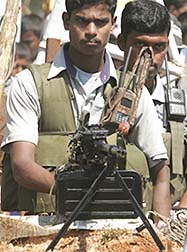Military says Tamil Tiger suicide attack kills 92 Sri Lankan sailors
Tamil Tiger rebels rammed a truck loaded with explosives into a naval convoy in central Sri Lanka on Monday, killing at least 92 sailors and wounding more than 150 in what the military described as a cold-blooded massacre.

"All these people were without weapons and were going on leave," military spokesman Brig. Prasad Samarasinghe said.
Samarasinghe said the attack happened near the town of Dambulla, about 150 kilometers (90 miles) northeast of the capital Colombo, when the Liberation Tigers of Tamil Eelam rammed a small truck loaded with explosives into a convoy of military buses.
The blast killed 92 sailors, while more than 150 were wounded and evacuated to nearby hospitals.
He said the buses were carrying sailors from the port town of Trincomalee.
President Mahinda Rajapakse's office said in a statement that the attack "was further proof of the LTTE's unmitigated commitment to violence to achieve its ends and was in total disregard of international demands for it to abandon violence and seek peaceful means to achieve its goals."
The military called the attack, one of the deadliest since a Norwegian-brokered 2002 cease-fire, a "cold-blooded massacre."
"This inhuman act is a clear revenge by the terrorists on the navy who inflicted successive defeats for LTTE against their attempts of smuggling arms and explosives," a military statement said.
The navy on Sunday destroyed a trawler loaded with arms along the west coast, killing at least five Tamil Tiger separatists.
A witness said that several of the buses attacked had caught fire, while the truck driven by the suicide bomber was destroyed. He said the body of the truck driver was found about 50 meters (yards) from the scene.
The attack comes as a Japanese envoy held talks with the Sri Lankan president Monday amid intensified diplomatic efforts to strengthen the peace process between the government and rebels ahead of scheduled talks between the two sides later this month in Switzerland.
It was not immediately clear what impact the attack would have on those talks. There was no immediate comment from the rebels on the attack, although they routinely deny their involvement.
Yasushi Akashi also planned to travel to the rebel stronghold in the north to talk with the Tiger leadership during his five days in Sri Lanka. A Japanese Embassy spokesman said he had no information yet on whether those plans would change following the attack.
Thorfinnur Omarsson, a spokesman for the Sri Lanka Monitoring Mission, urged the government and rebels to keep their commitment to the peace talks despite the deadly attack.
"Obviously this is a brutal attack and a serious threat to the peace process," Omarsson said. "But the people of Sri Lanka deserve that the talks will take place as planned."
Norwegian peace envoy Jon Hanssen-Bauer was also scheduled to return to the island this week ahead of the planned Oct. 28-29 peace talks, while U.S. Assistant Secretary of State for Central and South Asian Affairs Richard Boucher will make a two-day visit to Sri Lanka starting Thursday.
The flurry of diplomatic activity comes after some of the bloodiest fighting since the cease-fire was signed in 2002, temporarily ending nearly two decades of civil war. Heavy battles last Wednesday on the northern Jaffna Peninsula left hundreds of combatants dead, despite commitments by both the government and rebels to return to the negotiating table.
The military controls nearly all of the Jaffna Peninsula, which the ethnic Tamil minority claim as their cultural heartland. The Tigers still hold small pockets in the area.
Fighting has left about 2,000 people dead this year, according to the Sri Lanka Monitoring Mission, set up to oversee the cease-fire, reports AP.
The Tigers have been fighting since 1983 for a separate homeland for the Tamil minority in the north and east, citing decades of discrimination by the majority Sinhalese. About 65,000 people were killed before the 2002 cease-fire.
Meanwhile, an air force fighter jet crashed in a lagoon about 30 kilometers (18 miles) from Colombo after suffering a technical fault, but the pilot ejected to safety, the military said.
Subscribe to Pravda.Ru Telegram channel, Facebook, RSS!

